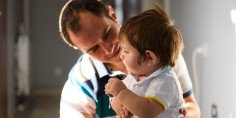Antiganee Kemp spotted the flyer outside a classroom at Midlands Technical College and was intrigued. The notice highlighted a program to help parents and children grow together by developing family-building skills and Kemp, a single parent, decided to sign up. “I often worried that I was being too strict — that I didn’t know what behavior was appropriate for my child at her age,” she says. “I wanted to learn how to be the best parent possible for my daughter.”
For 14 weeks, Kemp and 7‑year-old T’Mauri participated in the Strengthening Families Program in Columbia, S.C. Kemp learned so much from the sessions, she started encouraging friends to sign up. “I went the first time just to see what it was all about,” she says. “But I left with a lot to think about and knew it would be a good thing for T’Mauri and me to keep attending.”
Supporting Impact
The Strengthening Families Program was first developed and tested in the mid-1980s by Karol Kumpfer, a psychologist and university professor. Randomized control trials showed the training could significantly improve parenting skills and family relationships, and reduce problem behaviors in children. As bonds between parents and children strengthen, the goal is to help increase family resiliency and decrease risk factors for substance abuse, aggression, delinquency and school failure.
Across the country, the Strengthening Families Program has been offered in schools, drug treatment centers, housing projects, homeless shelters, churches, and family and youth service agencies. In the Carolinas, The Duke Endowment is partnering with the S.C. Department of Social Services and the N.C. Division of Social Services to offer the program. Two organizations — Prevent Child Abuse North Carolina and Children’s Trust of South Carolina — provide training and implementation help for local nonprofits to deliver the sessions. The Endowment has awarded nearly $2 million in grants since 2008 to support the work.
Now in its second year in South Carolina, the program is offered through 10 agencies serving families in 14 counties. The expectation is to expand. Children’s Trust has two coordinators on staff — Karen Dukes-Smith and Sherri Caldwell — who work with each local group.
“This all came together several years ago through a public-private partnership that looked at how we could have an impact on child well-being by working together,” Dukes-Smith says. “We believed this program had a lot of value. The intent was to pilot it, test it, and get it off the ground — but to make sure we were able to do it right.”





